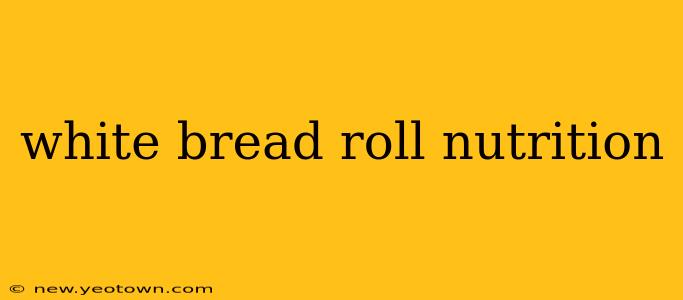Let's be honest, sometimes nothing beats the soft, pillowy texture of a fresh white bread roll. But beyond the deliciousness, what's really inside? This isn't just a nutritional breakdown; it's a story about understanding what fuels our bodies, and how seemingly simple foods can contribute to our overall well-being. We'll unravel the nutritional facts, address common questions, and empower you to make informed choices about this everyday staple.
What are the nutritional values of a white bread roll?
The nutritional content of a white bread roll can vary slightly depending on the brand and size. However, a typical small (around 50g) white bread roll generally contains approximately:
- Calories: 150-200
- Carbohydrates: 30-40g (mostly simple carbohydrates)
- Protein: 4-6g
- Fat: 1-3g
- Fiber: 1-2g
These values are estimates, and it's always best to check the specific nutritional information on the packaging of the brand you're consuming. Remember that added ingredients, like seeds or sweeteners, can significantly alter these figures.
Are white bread rolls healthy?
Ah, the million-dollar question. The short answer? It's complicated. White bread rolls, due to their refined nature, are primarily composed of simple carbohydrates. These are quickly digested, leading to a rapid spike in blood sugar levels. While not inherently "unhealthy," regular consumption of these simple carbs can contribute to weight gain, energy crashes, and increased risk of type 2 diabetes if not balanced with a healthy overall diet and lifestyle. They also tend to be lower in fiber than whole-wheat options, meaning less support for gut health.
How many calories are in a white bread roll?
As mentioned earlier, a small white bread roll usually packs around 150-200 calories. However, the calorie count can increase significantly if you add butter, spreads, or fillings. Always consider the entire meal's caloric intake, not just the bread roll itself.
What are the benefits of eating a white bread roll?
Despite their potential drawbacks, white bread rolls do offer some advantages:
- Convenience: They're readily available, affordable, and easy to consume.
- Taste and Texture: The soft, fluffy texture appeals to many, and they are versatile for a variety of meals and sandwiches.
- Energy Source: They provide a quick source of energy, although this is often short-lived due to the rapid digestion of simple carbohydrates.
Are white bread rolls high in carbohydrates?
Yes, white bread rolls are relatively high in carbohydrates, mostly simple carbohydrates. While carbs provide energy, the refined nature of white flour means a lack of fiber and slower release of glucose, leading to the aforementioned blood sugar spikes and potential health concerns.
What are the best alternatives to white bread rolls?
For a healthier option, consider switching to:
- Whole Wheat Rolls: These offer more fiber, complex carbohydrates, and nutrients.
- Sourdough Rolls: The fermentation process makes sourdough more digestible and less likely to cause blood sugar spikes.
- Multigrain Rolls: These provide a broader range of nutrients and fiber.
The Takeaway: Making Informed Choices
Ultimately, the key to enjoying white bread rolls – and any food – is moderation and balance. Occasional indulgence won't cause significant harm, but building a diet rich in whole grains, fruits, vegetables, and lean protein is crucial for long-term health. By understanding the nutritional content and making conscious choices, you can enjoy the occasional treat without compromising your well-being.

